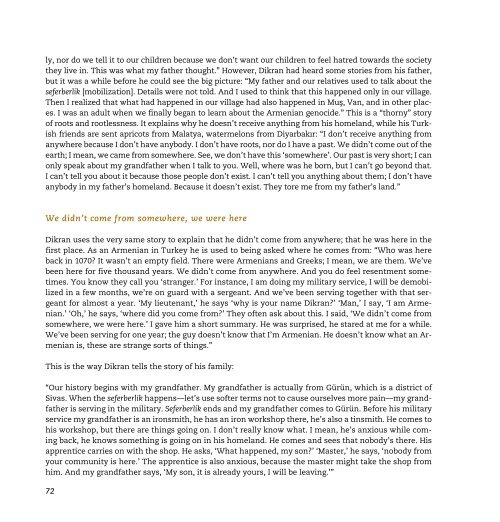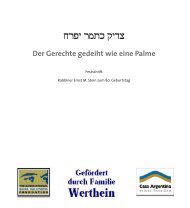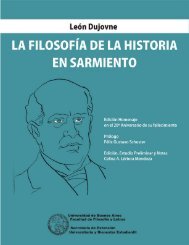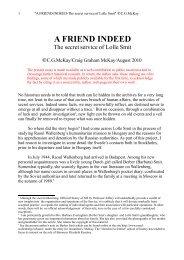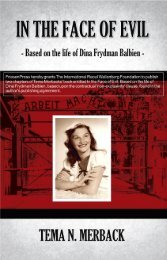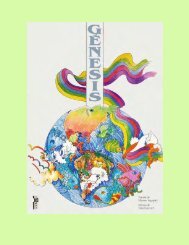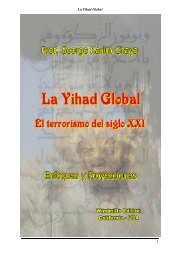ly, nor do we tell it <strong>to</strong> our children because we don’t want our children <strong>to</strong> feel hatred <strong>to</strong>wards the societythey live in. This was what my father thought.” However, Dikran had heard some s<strong>to</strong>ries from his father,but it was a while before he could see the big picture: “My father and our relatives used <strong>to</strong> talk about theseferberlik [mobilization]. Details were not <strong>to</strong>ld. And I used <strong>to</strong> think that this happened only in our village.<strong>The</strong>n I realized that what had happened in our village had also happened in Muş, Van, and in other places.I was an adult when we finally began <strong>to</strong> learn about the Armenian genocide.” This is a “thorny” s<strong>to</strong>ryof roots and rootlessness. It explains why he doesn’t receive anything from his homeland, while his Turkishfriends are sent apricots from Malatya, watermelons from Diyarbakır: “I don’t receive anything fromanywhere because I don’t have anybody. I don’t have roots, nor do I have a past. We didn’t come out of theearth; I mean, we came from somewhere. See, we don’t have this ‘somewhere’. Our past is very short; I canonly speak about my grandfather when I talk <strong>to</strong> you. Well, where was he born, but I can’t go beyond that.I can’t tell you about it because those people don’t exist. I can’t tell you anything about them; I don’t haveanybody in my father’s homeland. Because it doesn’t exist. <strong>The</strong>y <strong>to</strong>re me from my father’s land.”We didn’t come from somewhere, we were hereDikran uses the very same s<strong>to</strong>ry <strong>to</strong> explain that he didn’t come from anywhere; that he was here in thefirst place. As an Armenian in Turkey he is used <strong>to</strong> being asked where he comes from: “Who was hereback in 1070? It wasn’t an empty field. <strong>The</strong>re were Armenians and Greeks; I mean, we are them. We’vebeen here for five thousand years. We didn’t come from anywhere. And you do feel resentment sometimes.You know they call you ‘stranger.’ For instance, I am doing my military service, I will be demobilizedin a few months, we’re on guard with a sergeant. And we’ve been serving <strong>to</strong>gether with that sergeantfor almost a year. ‘My lieutenant,’ he says ‘why is your name Dikran?’ ‘Man,’ I say, ‘I am Armenian.’‘Oh,’ he says, ‘where did you come from?’ <strong>The</strong>y often ask about this. I said, ‘We didn’t come fromsomewhere, we were here.’ I gave him a short summary. He was surprised, he stared at me for a while.We’ve been serving for one year; the guy doesn’t know that I’m Armenian. He doesn’t know what an Armenianis, these are strange sorts of things.”This is the way Dikran tells the s<strong>to</strong>ry of his family:“Our his<strong>to</strong>ry begins with my grandfather. My grandfather is actually from Gürün, which is a district ofSivas. When the seferberlik happens—let’s use softer terms not <strong>to</strong> cause ourselves more pain—my grandfatheris serving in the military. Seferberlik ends and my grandfather comes <strong>to</strong> Gürün. Before his militaryservice my grandfather is an ironsmith, he has an iron workshop there, he’s also a tinsmith. He comes <strong>to</strong>his workshop, but there are things going on. I don’t really know what. I mean, he’s anxious while comingback, he knows something is going on in his homeland. He comes and sees that nobody’s there. Hisapprentice carries on with the shop. He asks, ‘What happened, my son?’ ‘Master,’ he says, ‘nobody fromyour community is here.’ <strong>The</strong> apprentice is also anxious, because the master might take the shop fromhim. And my grandfather says, ‘My son, it is already yours, I will be leaving.’”72
“I don’t know why, but my grandfather leaves that evening. He is afraid. But he learns that his sisteris in Afşın. Why is his sister there? Now the convoy leaves Gürün but some are massacred there. <strong>The</strong>yset the women off on the road. While the women are on the way, Lieutenant Mehmet sees Nikyar andtakes her as a bride for his son. He has a son called Osman. He marries our aunt <strong>to</strong> Osman. After Nikyaris married she becomes Nuran. This is Osman’s third wife; he already has two wives. He takes her as athird wife because she’s a beautiful Armenian girl. When he learns about this, my grandfather comes<strong>to</strong> Afşın. His brother-in-law takes care of him when he arrives. You know, he doesn’t let him in the city,they are afraid something might happen. He sends my grandfather <strong>to</strong> work in the fields. A relative of hisbrother-in-law, a man called Hasan the Tall is at home. <strong>The</strong>y call him doçdrej in Kurdish, which meanssomebody tall, I guess. He asks, ‘What is your profession, my boy?’ And my grandfather says, ‘I’m a tinsmith.’‘Well,’ he says, ‘I’ll take you <strong>to</strong> our village then. <strong>The</strong>re are forty, forty-five Armenians in our village.We hide them in a cave, they’re all safe from the seferberlik. Because they might kill you here if theysee you.’ While going <strong>to</strong> the village, Hasan the Tall buys him copper, ammonium and a ventila<strong>to</strong>r. Hegives him 22 liras. He says, ‘you do your job in the village and then you’ll pay me the money back.’ Mygrandfather goes <strong>to</strong> the village. Since our village is an Alevi Kurdish village, it is against the state. Andthat’s why they hid our people.”Marişave<strong>The</strong>y call our people ‘night people’ or marişave in Kurdish. <strong>The</strong>y are called this because our people appearat night; they are afraid during the day because the gendarme can capture them. <strong>The</strong> villagers bringfood from the village <strong>to</strong> the cave for the entire time they are there. <strong>One</strong> day the gendarme comes <strong>to</strong> thevillage <strong>to</strong> search for fugitive soldiers. He captures a soldier, because there are many fugitive soldiers inthose days, you know it’s a time of war. He captures one of the Kurds. Upon this, the fugitive says <strong>to</strong> thelieutenant, ‘Take us away and then our wives will be left <strong>to</strong> the gavurs.’ He asks, ‘What gavur?’ <strong>The</strong> gendarmethen captures both the fugitives and the Armenians. <strong>The</strong>n Hasan the Tall says ‘I won’t hand overany of the Armenians.’ He gives the lieutenant a bribe of a hundred lira. A hundred lira is a lot of money.He says <strong>to</strong> the fugitive soldiers, ‘You will all give five lira each.’ He takes five lira from each, and ten lirafrom the one who informed the lieutenant. He gets his hundred lira back and saves our people.”“My grandfather grows up <strong>to</strong> be a young man. And it is now peaceful in Turkey, things settle down.Hasan the Tall gets all the Armenians <strong>to</strong>gether and says, ‘It’s peaceful now, get out of the cave.’ Beforehe was married, my grandfather loved a Kurdish girl there. Hasan the Tall says ‘No, we brought you hereso that you could remain Armenian, there’s an Armenian girl in Kerevin, let’s get her for you, Bozo.’ <strong>The</strong>ycall him Bozo because he’s blond. My grandmother’s name is Baydzar, they take her and marry her <strong>to</strong>my grandfather.”“I saw that cave, we walked there from our village in two hours. That cave used <strong>to</strong> be in a forest backthen. It is not a hidden place anymore. I couldn’t enter because they built a wall in the mouth of the cave.73
- Page 2 and 3:
Published by:Institut für Internat
- Page 5 and 6:
ContentsForeword...................
- Page 7 and 8:
ForewordThe project “Adult Educat
- Page 10 and 11:
Aras, Yasin Aras, Welat Ay, Cenk Ce
- Page 12 and 13:
The main audience of this book is o
- Page 15 and 16:
“Wish they hadn’t left”:The B
- Page 17 and 18:
ed by 1915 and where memories of Ar
- Page 19 and 20:
1915 tends to be represented by int
- Page 21 and 22: Yet to a large extent, Turkish inte
- Page 23 and 24: this, we can’t. It’s impossible
- Page 25 and 26: een very advanced in trade and craf
- Page 27 and 28: How to Come to Terms with Phantom P
- Page 29 and 30: It is always you who has to be nice
- Page 32 and 33: to the way he was raised: “They f
- Page 34 and 35: empathize with Armenians: “My aun
- Page 36 and 37: Adil is not the only one marked by
- Page 38 and 39: ness may be an attempt to overcome
- Page 40 and 41: dernity and the oral transmission o
- Page 42 and 43: A soup pot with spoons around itAt
- Page 44 and 45: What if My Mother is Armenian?Ruhi
- Page 46 and 47: If I were younger I’d get baptize
- Page 48: with butter. We’ll serve the impo
- Page 51 and 52: The time Salih and Gavrik are worki
- Page 53 and 54: Turkey’s changing context is refr
- Page 55 and 56: ‘It was to be expected.’ And my
- Page 57 and 58: against one another. The feet of th
- Page 59 and 60: Fear of Losing a CityZübeyde was b
- Page 61 and 62: half for me.’ But what do our Mus
- Page 63 and 64: e discussed when the kids were arou
- Page 65 and 66: possible by the difference in relig
- Page 67 and 68: The Charm of AraratMehmet is a 62-y
- Page 69 and 70: dogs protected the sheep against wo
- Page 71: The Story of the “Night People”
- Page 75: Research in Armenia:“Whom to Forg
- Page 78 and 79: and can generally be located in Tur
- Page 80 and 81: “Whom to Forgive? What to Forgive
- Page 82 and 83: “Private Stories”After the esta
- Page 84 and 85: Recalling MemoriesOral history diff
- Page 86 and 87: In the village of Ujan, where the v
- Page 88 and 89: The home-museum of Gevork Chaush in
- Page 90 and 91: Memorial in the Ashnak village dedi
- Page 92 and 93: other regions are entirely populate
- Page 94 and 95: sources and materials for their mem
- Page 96 and 97: Ergir’s Soil is Strong, Ergir’s
- Page 98: Tatevik, the granddaughterof Mihran
- Page 101 and 102: eral meanings in Armenian -”whole
- Page 103 and 104: The Gospel with Golden Binding of S
- Page 105 and 106: keeps a copper chalice that was bro
- Page 107 and 108: In some families the passports of t
- Page 109 and 110: at that time, Mustafa and Jamal, wh
- Page 111 and 112: People were so frightened to lose g
- Page 113 and 114: naked, they were decapitating every
- Page 115 and 116: Water, Fire, Desert“There was an
- Page 117 and 118: his mother dragged him behind her,
- Page 119 and 120: Many of our narrators mention the R
- Page 121 and 122: In the word-stock of the survivors
- Page 123 and 124:
in Kurdish villages, and helping th
- Page 125 and 126:
“Well, They Are Human Too”Even
- Page 127 and 128:
member this well, they said, the el
- Page 129 and 130:
speak to each other. Questioned by
- Page 131 and 132:
Hamze Ptshuk, survived from Hosnut
- Page 133 and 134:
“I don’t Know...”Why did this
- Page 135 and 136:
“My Dear Almast, Write it Down, W
- Page 137 and 138:
took his rifle and ran. The dog fel
- Page 139 and 140:
she didn’t tell it to me. In the
- Page 141 and 142:
elder guy in this house died and hi
- Page 143 and 144:
AH - Turks always killed to get int
- Page 145 and 146:
“My Father used to Tell us at Hom
- Page 147 and 148:
person... I have never seen him, bu
- Page 149 and 150:
gotten what you knew”. So, out of
- Page 151 and 152:
a paid Adult Residential Facility,
- Page 153 and 154:
It was probably after 60s... My fat
- Page 155 and 156:
the Vardevar 1 day . Even if we mak
- Page 157 and 158:
that this wasn’t a dream... and..
- Page 159 and 160:
was our historical village. Nich, I
- Page 161 and 162:
just filming around myself with no
- Page 163 and 164:
that person whether I could take a
- Page 165:
[Turk. wife]”. In the morning I t
- Page 168 and 169:
4 Albert Mamikonyan,1953, in Kirova
- Page 170 and 171:
11 Almast Harutyunyan,1920, Ujan vi
- Page 172 and 173:
18 Eleonora Ghazaryan.1949, Ashnak
- Page 174 and 175:
26 Nairi Tajiryan,1936, Egypt (Cair
- Page 176:
33 Vazgen Ghukasyan,1933, Ashnak vi


